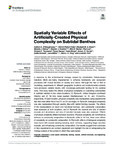Spatially Variable Effects of Artificially-Created Physical Complexity on Subtidal Benthos
| dc.contributor.author | O’Shaughnessy, KA | |
| dc.contributor.author | Perkol-Finkel, S | |
| dc.contributor.author | Strain, EMA | |
| dc.contributor.author | Bishop, MJ | |
| dc.contributor.author | Hawkins, SJ | |
| dc.contributor.author | Furtado Frota, Francisco Gabriel | |
| dc.contributor.author | Lunt, Paul | |
| dc.contributor.author | Thompson, Richard | |
| dc.contributor.author | Hadary, T | |
| dc.contributor.author | Shirazi, R | |
| dc.contributor.author | Yunnie, ALE | |
| dc.contributor.author | Amstutz, A | |
| dc.contributor.author | Milliet, L | |
| dc.contributor.author | Yong, CLX | |
| dc.contributor.author | Firth, Louise | |
| dc.date.accessioned | 2021-10-13T14:54:25Z | |
| dc.date.available | 2021-10-13T14:54:25Z | |
| dc.date.issued | 2021-08-20 | |
| dc.identifier.issn | 2296-701X | |
| dc.identifier.issn | 2296-701X | |
| dc.identifier.other | 690413 | |
| dc.identifier.uri | http://hdl.handle.net/10026.1/18050 | |
| dc.description.abstract |
<jats:p>In response to the environmental damage caused by urbanization, Nature-based Solutions (NbS) are being implemented to enhance biodiversity and ecosystem processes with mutual benefits for society and nature. Although the field of NbS is flourishing, experiments in different geographic locations and environmental contexts have produced variable results, with knowledge particularly lacking for the subtidal zone. This study tested the effects of physical complexity on colonizing communities in subtidal habitats in two urban locations: (1) Plymouth, United Kingdom (northeast Atlantic) and (2) Tel Aviv, Israel (eastern Mediterranean) for 15- and 12-months, respectively. At each location, physical complexity was manipulated using experimental tiles that were either flat or had 2.5 or 5.0 cm ridges. In Plymouth, biological complexity was also manipulated through seeding tiles with habitat-forming mussels. The effects of the manipulations on taxon and functional richness, and community composition were assessed at both locations, and in Plymouth the survival and size of seeded mussels and abundance and size of recruited mussels were also assessed. Effects of physical complexity differed between locations. Physical complexity did not influence richness or community composition in Plymouth, while in Tel Aviv, there were effects of complexity on community composition. In Plymouth, effects of biological complexity were found with mussel seeding reducing taxon richness, supporting larger recruited mussels, and influencing community composition. Our results suggest that outcomes of NbS experiments are context-dependent and highlight the risk of extrapolating the findings outside of the context in which they were tested.</jats:p> | |
| dc.format.extent | 690413- | |
| dc.language.iso | en | |
| dc.publisher | Frontiers Media | |
| dc.subject | urbanization | |
| dc.subject | ocean sprawl | |
| dc.subject | biodiversity | |
| dc.subject | seeding | |
| dc.subject | mussels | |
| dc.subject | artificial structures | |
| dc.subject | eco-engineering | |
| dc.subject | ecological engineering | |
| dc.title | Spatially Variable Effects of Artificially-Created Physical Complexity on Subtidal Benthos | |
| dc.type | journal-article | |
| dc.type | Journal Article | |
| plymouth.author-url | https://www.webofscience.com/api/gateway?GWVersion=2&SrcApp=PARTNER_APP&SrcAuth=LinksAMR&KeyUT=WOS:000728849000001&DestLinkType=FullRecord&DestApp=ALL_WOS&UsrCustomerID=11bb513d99f797142bcfeffcc58ea008 | |
| plymouth.volume | 9 | |
| plymouth.publication-status | Published online | |
| plymouth.journal | Frontiers in Ecology and Evolution | |
| dc.identifier.doi | 10.3389/fevo.2021.690413 | |
| plymouth.organisational-group | /Plymouth | |
| plymouth.organisational-group | /Plymouth/Faculty of Science and Engineering | |
| plymouth.organisational-group | /Plymouth/Faculty of Science and Engineering/School of Biological and Marine Sciences | |
| plymouth.organisational-group | /Plymouth/Faculty of Science and Engineering/School of Geography, Earth and Environmental Sciences | |
| plymouth.organisational-group | /Plymouth/REF 2021 Researchers by UoA | |
| plymouth.organisational-group | /Plymouth/REF 2021 Researchers by UoA/UoA06 Agriculture, Veterinary and Food Science | |
| plymouth.organisational-group | /Plymouth/REF 2021 Researchers by UoA/UoA07 Earth Systems and Environmental Sciences | |
| plymouth.organisational-group | /Plymouth/REF 2021 Researchers by UoA/UoA14 Geography and Environmental Studies | |
| plymouth.organisational-group | /Plymouth/Research Groups | |
| plymouth.organisational-group | /Plymouth/Research Groups/Marine Institute | |
| plymouth.organisational-group | /Plymouth/Users by role | |
| plymouth.organisational-group | /Plymouth/Users by role/Academics | |
| plymouth.organisational-group | /Plymouth/Users by role/Researchers in ResearchFish submission | |
| dcterms.dateAccepted | 2021-07-20 | |
| dc.rights.embargodate | 2021-10-15 | |
| dc.identifier.eissn | 2296-701X | |
| dc.rights.embargoperiod | Not known | |
| rioxxterms.versionofrecord | 10.3389/fevo.2021.690413 | |
| rioxxterms.licenseref.uri | http://www.rioxx.net/licenses/all-rights-reserved | |
| rioxxterms.licenseref.startdate | 2021-08-20 | |
| rioxxterms.type | Journal Article/Review |


